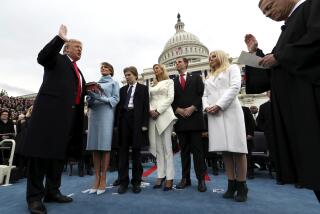Clinton Sees No Need for Proposed School Prayer Measure
- Share via
WASHINGTON — President Clinton said Saturday that “appropriate religious activity has flourished in our schools” under his administration and said it would be wrong to amend the Constitution to authorize prayer in public schools.
In his weekly radio address, the president announced he is issuing revised federal guidelines that describe a variety of permissible religious practices in schools.
These include the freedom and the right to pray privately and individually in schools, say grace at lunch, form religious clubs and use school facilities like any other organization and read the Bible or any religious material during free class time or in study halls. Students also are free from requirements or coercion to participate in any kind of religious activity while at school.
The guidelines, issued in 1995, have been modified after court rulings to give schools the discretion to excuse students from any lessons or classes “that are inconsistent with their religious beliefs,” according to material issued by the Department of Education. Schools also have been given discretion to “decide whether students can wear religious garb such as yarmulkes and head scarves to class,” the department said.
The president’s remarks, emphasizing the religious freedom students now have, were intended as criticism of a proposed constitutional amendment to make it easier for students to join in group prayer at school.
The proposal, by Rep. Ernest J. Istook Jr. (R-Okla.), is scheduled for a House vote this week. The Religious Freedom Amendment would have to be approved by two-thirds of the House members present and voting. It would then require approval by a two-thirds vote in the Senate and ratification by 34 states before it could become part of the Constitution.
The federal guidelines, which will be mailed to every school district, are part of an effort to help people find common ground about religious expression. This type of activity “is the right way to protect religious freedom,” Clinton said. “There’s also a wrong way, amending the Constitution.”
Prayer in the schools is a “complex and emotional issue,” the president acknowledged, noting that it has resulted in “great controversy in our courts.” But he insisted that children have well-protected rights to express their religious feelings and beliefs. “ . . . Nothing in the Constitution requires schools to be religion-free zones, where children must leave their faiths at the schoolhouse door,” Clinton said.
The guidelines protect student rights and encourage school districts to “develop common understandings about what kind of religious activity is permissible in schools and help them to avoid costly lawsuits and divisive disputes,” the president said. He noted that St. Louis changed its policies after a student was “wrongly punished for praying quietly in the cafeteria. Schools in suburban Atlanta hold workshops and distribute the guidelines to all teachers, he said.
“I call on all districts to make sure the guidelines are understood and used by school principals, teachers, parents and students themselves,” Clinton said.
While rejecting the idea of a constitutional amendment, the president repeatedly emphasized his support for moral and religious training on a voluntary basis by students.
“Studies show that children who are involved in religious activities are much less likely to use drugs,” he said. “In a world that increasingly exposes children to images of violence and immorality, common sense tells us they are more likely to stay out of trouble and live up to their full potential when they’re spiritually grounded.”
More to Read
Sign up for Essential California
The most important California stories and recommendations in your inbox every morning.
You may occasionally receive promotional content from the Los Angeles Times.













